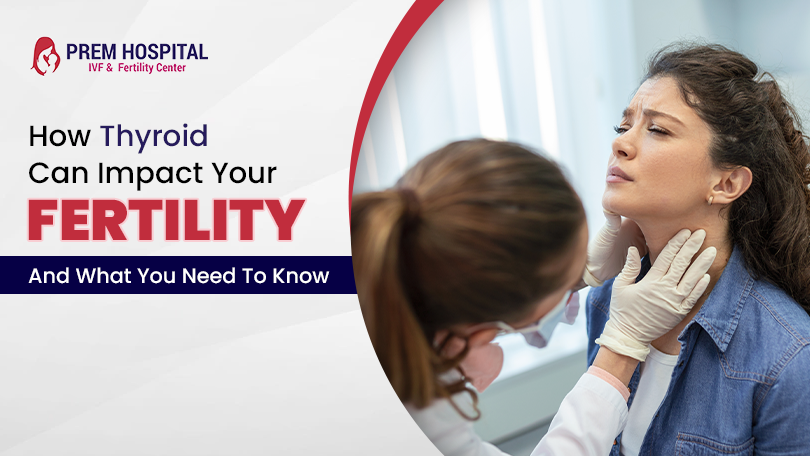The thyroid gland is in front of our neck and has a butterfly shape. It produces hormones that are responsible for the proper functioning of our body’s metabolism. Fertility is a couple’s ability to conceive and give birth to a baby. There is a relation between the thyroid and fertility; sometimes, your thyroid may become the culprit for infertility.
Thyroid disorders
This disorder is responsible for the dysregulated functioning of the thyroid gland, which results in underproduction (hypothyroidism) or overproduction (hyperthyroidism) of triiodothyronine (T3) and thyroxine (T4). You can consult a fertility specialist doctor to know more about your thyroid condition.
How thyroid is responsible for infertility
Both hyperthyroidism and hypothyroidism can have an adverse impact on infertility. It has a negative effect on a woman’s capability to conceive and carry a fetus to term. Abnormal TSH level can impact ovulation, and when a patient has thyroid, she may experience disruption in the last half cycle of ovulation. Such a disorder is treated with progesterone supplements. In unregulated thyroid levels, females may face difficulty becoming pregnant because of the absence of implantation.
Women can also face miscarriage due to incomplete implantation. Signs of low level or misfunctioning of progesterone include:
- Longer or shorter duration of the menstrual cycle
- Higher or lighter bleeding than usual.
- The shorter or longer window for bleeding than normal.
Fertility is not only related to women. Men with thyroid disorders can also affect fertility. Dysregulated thyroid function can have an impact on sperm mobility and quality. It makes it difficult for sperm to enter the egg for implantation.
Hence you need to choose the best gynecologist in Meerut who can assure you about safe pregnancy while keeping the impact of thyroid at bay.
Hypothyroidism and Infertility
There is a little bit of possibility of the impact of thyroid on fertility
- Change in the menstrual cycle makes it difficult to conceive.
- Interference with egg release from ovaries.
- Enhance the risk of miscarriage.
- Increase the possibility of premature birth.
Hypothyroidism is common among females and can be diagnosed through a blood test of stimulating thyroid hormone (TSH). Below are some of the symptoms of hypothyroidism:
- Heavy and frequent menstrual cycle
- Fatigue
- Muscle soreness
- Weight gain
- Forgetfulness
- Intolerance to cold
Usually, low thyroid hormone levels won’t have any impact on pregnancy. However, in some cases, hypothyroidism can result in miscarriage or fetal death. Hence you must take your medications regularly throughout the pregnancy and consult the best fertility hospital in Meerut for proper guidance.
Hyperthyroidism
Graves is an autoimmune condition which is mostly responsible for hyperthyroidism. Generation of too many thyroid hormones results in hyperthyroidism which impacts fertility by:
- Disturbance in the menstrual cycle
- Decrease in sperm count
- Enhanced risk of early-term miscarriage
- Risk of a premature baby
Women with hyperthyroidism are given low-effective medications during pregnancy, as their drugs can cross the placenta. Hence, if the case of thyroid history, it is important to speak with the doctor about it, even if it is in control.
Autoimmunity, fertility and inflammation
Autoimmunity can also hurt fertility, even if your TSH level is normal. As per doctors, immune imbalance shown by thyroid antibodies can have a negative effect on fertility:
- Causing difficulty in egg fertilization
- Problem in implantation
- Enhanced risk of miscarriage.
As the presence of both thyroid hormone and antibodies can impact fertility, you must consult your doctor to maintain a stable balance as per your individual needs, as there are various female infertility treatments available to solve this issue.
Lifestyle interventions
Your body should remain fit to conceive a baby. That implies you need to be physically active, which will help you during pregnancy. Well! You don’t need to be a bodybuilder, but it’s a good habit to do cardiovascular activities and resistance training to remain healthy.
You can follow an autoimmune diet protocol, there are different diet plans available to treat autoimmune conditions, and you can choose the one which suits you the best. Avoid artificial additives and processed food.
Vitamin D can also play a pivotal role in maintaining your thyroid health as it lowers thyroid antibodies. In addition, you can easily find Vitamin D supplements in case you cannot get a sun bath.
Work with your endocrinologist.
Truly, the thyroid can impact your fertility, but it doesn’t make it impossible. You must regulate your thyroid levels which will solve your fertility issues associated with the thyroid. Autoimmune conditions can complicate your pregnancy process, but there are plenty of ways to make your body healthy and more balanced.
Remember that each body is different. Your doctor will find the best way suitable for your body and help you conceive. You can also undergo fertility counselling in case you want to reduce the anxiety associated with thyroid and pregnancy.

